Though it's not really necessary to get by, you will undoubtedly have an easier and more enjoyable experience in Thailand from any time you spend learning Thai. Most Thais don't expect a foreigner to be able to speak any of their language, and are often visibly surprised if you can string a few sentences together. It's also encouraging how many people will tell you that you poot tai geng (speak Thai well), no matter how limited your command of the language really is. Even with only a fairly small vocabulary, you will find it a lot easier to get discounted prices at shops and markets (rah kah poot tai dai, "Thai speaker prices) and to make friends amongst the locals.
Being a tonal language
Thai, like Chinese and Vietnamese, is a tonal language meaning that the same word can have a completely different meaning depending on it is pronounced. In total, there are 5 tones: Mid tone, high tone, low tone, rising tone and falling tone. A common example of the difficulty of tones in Thai is the word mai, whose meanings include "wood", "not", "silk", "burn", and "new" depending on what tone is used to pronounce it.
It's not always this bad though, and the context means you will often be understood even if the tone is wrong. In some cases though, the context is unlikely to help very much and you will have to get the pronunciation correct in order to be understood - glai (mid tone, meaning "far away") and glâi (falling tone, meaning "near") is a good example. It takes a long time to learn how to pronounce the tones correctly, and it's all too easy to make an embarrassing faux pas or inadvertently offend simply by getting the tone wrong on one word. Luckily most Thais realize how difficult it is for foreigners to speak their language, and are generally quite tolerant of any mistakes - which is just as well really.
Though there's no real way to know how to pronounce the tones except by listening to a native speaker, the rising and falling tones tend to be the easiest ones to pick up. The rising tone is approximately similar to the inflection used in English to indicate a question, the falling tone roughly like calling someone's name from far away. The low and high tones are respectively pronounced near the relative bottom and top of your vocal range.
Try to avoid speaking slowly and hesitantly, as this will distort the tone on the word and make you much more difficult to understand than if you spoke confidently. When speaking fairly quickly even the Thais routinely don't pronounce each and every tone, as there's simply not enough time to do so. If your tones aren't perfect, you stand a much chance of being understood by talking at the same normal speed, rather than hesitantly. You'll know you're well on the way to getting it right if you start being told that you poot tai chat (speak Thai clearly) rather than simply geng (well).
Tones on this website are indicated using tone marks on the first vowel of each syllable. If there is no tone mark, it is pronounced with a mid tone. Other tones are shown as follows:
- mái - Pronounced with a high tone.
- yài - Pronounced with a low tone.
- glâi - Pronounced with a falling tone.
- sŏon - Pronounced with a rising tone.
Essential words to know
These are given in English, Thai and an approximate pronunciation of the
Thai.
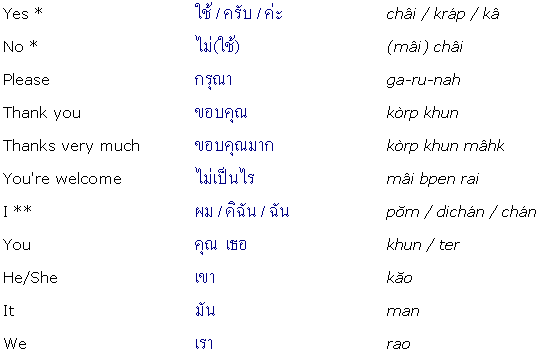
*"Yes" and "no" are often also indicated by simply repeating the verb. So if the question was "Do you want to go ?", it would be answered by saying "want" or "don't want", rather than "yes" or "no". Chai is an general word for "yes", but it's less used than it's English equivalent. Men can also use krap, and women ka, to indicate agreement. These are the same words used at the end of sentences to be polite.
**Pom is the polite way of saying "I / me" for a man in Thai, di-chan is the equivalent for a women. You're never likely to offend anyone by using either of these words, but there are also a lot of other words for 'I/Me' that can be used depending on the situation.
There's a similarly large amount of words for "you". Khun is the most common, and is a safe word to use when speaking to just about anybody. Tan is a very respectful word, used when talking to someone of markedly higher status than you in Thailand (e.g. a high court judge, or a Buddhist monk). Ter is more informal than khun, it's used when talking to friends.
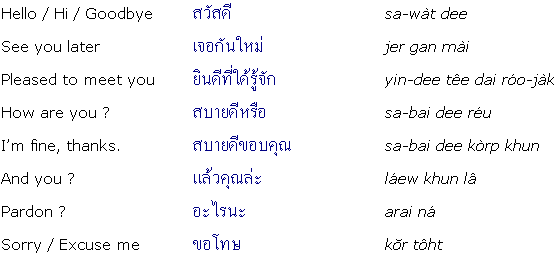
Sa-wàt dee is the general all purpose greeting in Thailand, the English distinctions of "Good morning", "Good afternoon" etc.. do exist but are almost never used. It's also almost always followed by kráp (for a man) or kâ (for a woman) to be polite.
Question Words
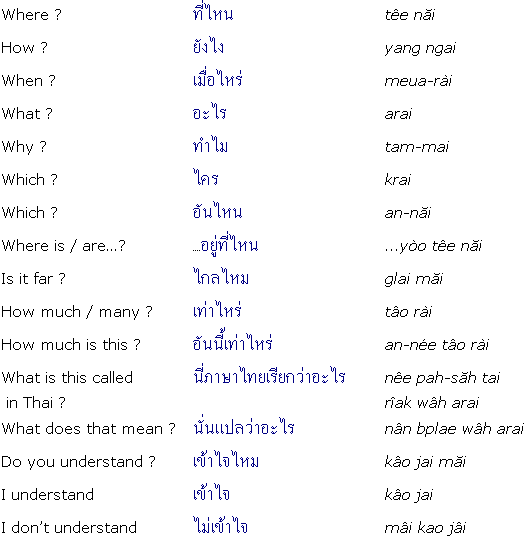
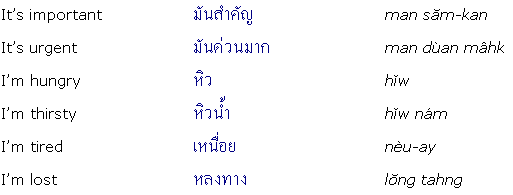
Useful Adjectives
These are given in English, Thai and an approximate pronunciation of the Thai.
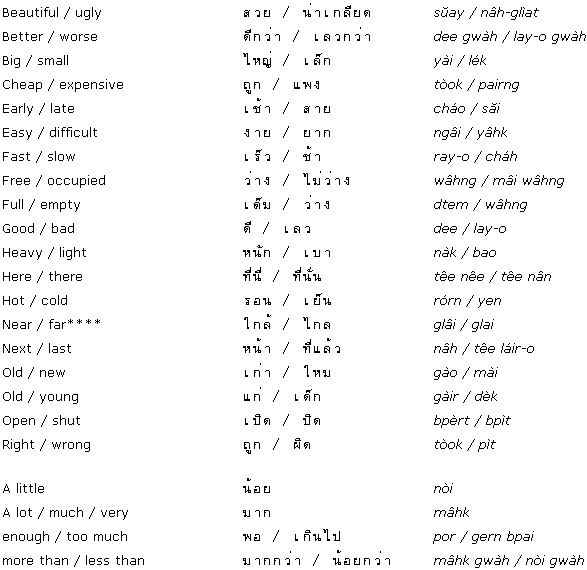
****It seems particularly challenging that two words with completely opposite meanings sound almost exactly the same, with only the tone differentiating them, but that's the way it is. It's made easier by the fact that "near" glâi is almost always said twice, while "far" glai never is.
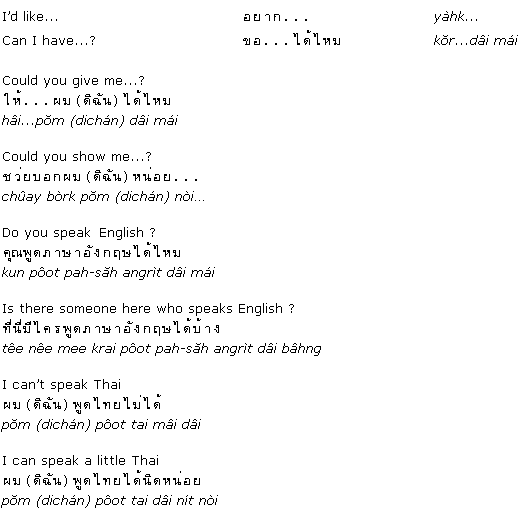
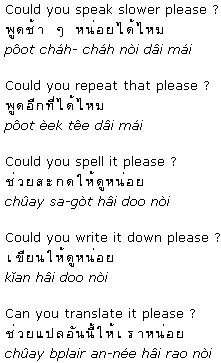
Pronunciation
The Thai language has it's own unique script with 44 consonants and 32
different vowels, though not all of these have a unique pronunciation.
Many
of the Thai consonants are very easy to pronounce, as there are exact
or
almost exact equivalents in English. They are pronounced as follows:
| b | As in back. |
| bp |
This is a sound halfway between b and p. If you have trouble saying it, pronouncing it as either b or p will often be understood. |
| ch |
As in chair. |
|
d
|
As in down.
|
| dt | This is a sound halfway between d and t. Again, saying it either as d or t will often be understood. |
|
f
|
As in food.
|
| g | As in gold. It is never pronounced as a 'soft' sound, such as in the English "gem". |
|
h
|
As in holiday.
|
| j | As in just. |
|
k
|
As in kill.
|
| l | As in lemon. |
| m | As in man |
| n | As in never. |
|
ng
|
As in sing. This is a
difficult sound because,
unlike in English, it can come at the start of words as
well as at
the end e.g. ngern (money). Practice by
saying words
like 'singing' without the si in front.
|
| p | As in pine. |
|
r
|
As in red.
|
| s | As in seat. |
|
t
|
As in take.
|
| w |
As in window. |
| y | As in yes. |
Though this is all of the consonant sounds, the range of consonant sounds which can come at the end of a syllable or word is limited only to p, t, k, y, n, w, and ng. When a consonant finishes a Thai word it is usually only half-pronounced.
The l and r sounds are often used almost interchangeably in Thai, though they are separate sounds. It's done because the proper r sound is quite hard to say, even for many Thais as well as non-native speakers. It should correctly be slightly trilled, but if you can't do this the l sound is closer to being correct than the flat English r.
It's very common when speaking Thai to drop the second consonant sound if two occur consecutively, so glai will be pronounced as gai, bplao as bpao, krap like kap etc...Like the swapping of the l and r sounds, this is not technically correct Thai (you wouldn't hear a TV newsreader doing it, for instance) but it is a widespread practice and one many non-native speakers also adopt when learning Thai. A stranger change that also sometimes occurs is when a gw sound is sometimes pronounced as f.
The Thai Vowel Sounds
The vowels are, by a distance, the trickiest parts of learning to speak Thai as quite a few simply have no equivalent in English. A approximate guide of to how to say most of the vowel sounds is below:
| a | As in fan. |
| ah | Like the ar sound in park. |
| ai |
As in Thai. This can be a long or a short sound, unlike in English. |
|
air
|
As in hair. This can
be a long or a short
sound, unlike in English.
|
| ao | As in Lao. This can be a long or a short sound, unlike in English. |
|
ay
|
As in day. This can be
a long or a short
sound, unlike in English.
|
| e | As in pen. |
|
ee
|
As in seen.
|
| er | As in letter, but pronounced with a lot more emphasis than you would in English - it's more like lettER. This can be a long or a short sound, unlike in English. |
| eu | There is no English equivalent to this sound. The closest is the sound of revulsion eugh ! This can be a long or a short sound, unlike in English. |
| eu-a | There is no English equivalent to this sound. It is pronounced the same as eu above, but with a sound after. |
| i | As in bin |
| ia | Like the ear sound in near, but without the r sound. This can be a long or a short sound, unlike in English. |
|
o
|
As in gone.
|
| oh | As in go. |
| oie | There is no English equivalent to this sound. It sounds similar to the French word oeil. In English, it's approximately similar to a long distorted oi sound. |
| oo | As in shoot |
|
oi
|
Like the oy sound in toy.
|
| or | Like the aw sound in dawn. This can be a long or a short sound, unlike in English. |
|
u
|
As in Luke, not the u
in bun.
This is the short equivalent to the long oo
sound.
|
| ua | There is no real equivalent to this sound in English, but it is approximately similar to the ewer sound in brewer. This can be a long or a short sound, unlike in English. |







Comments